人教版必修1Unit4 Earthquakes单词学案2
高中英语必修一人教版:Unit+4+Earthquakes+教学案2+
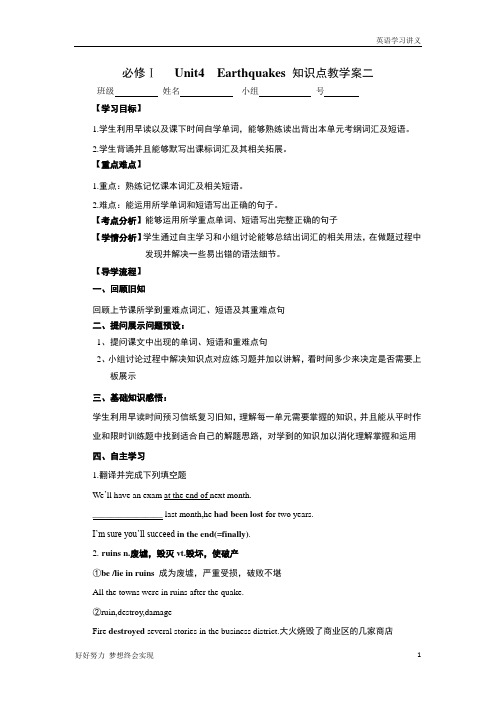
必修ⅠUnit4 Earthquakes知识点教学案二班级姓名小组号【学习目标】1.学生利用早读以及课下时间自学单词,能够熟练读出背出本单元考纲词汇及短语。
2.学生背诵并且能够默写出课标词汇及其相关拓展。
【重点难点】1.重点:熟练记忆课本词汇及相关短语。
2.难点:能运用所学单词和短语写出正确的句子。
【考点分析】能够运用所学重点单词、短语写出完整正确的句子【学情分析】学生通过自主学习和小组讨论能够总结出词汇的相关用法,在做题过程中发现并解决一些易出错的语法细节。
【导学流程】一、回顾旧知回顾上节课所学到重难点词汇、短语及其重难点句二、提问展示问题预设:1、提问课文中出现的单词、短语和重难点句2、小组讨论过程中解决知识点对应练习题并加以讲解,看时间多少来决定是否需要上板展示三、基础知识感悟:学生利用早读时间预习信纸复习旧知,理解每一单元需要掌握的知识,并且能从平时作业和限时训练题中找到适合自己的解题思路,对学到的知识加以消化理解掌握和运用四、自主学习1.翻译并完成下列填空题We’ll have an exam at the end of next month.________________ last month,he had been lost for two years.I’m sure you’ll succeed in the end(=finally).2.ruins n.废墟,毁灭vt.毁坏,使破产①be /lie in ruins成为废墟,严重受损,破败不堪All the towns were in ruins after the quake.②ruin,destroy,damageFire destroyed several stories in the business district.大火烧毁了商业区的几家商店The flood caused great damage to the city.洪水给这座城市造成了很大的破坏His career is/lies in ruins.他已前途尽毁3.bury埋葬,掩埋,隐藏be buried in=bury oneself in埋头于...,致力于...五、小组讨论1.shock vt.&vi.(使)震动,震惊;(使)受电击n.打击;震惊;震动[C]令人震惊的人或事shocked震惊的;shocking令人震惊的同类词:interest/frighten/relax/bore 2. a (great) number of大量,许多3.理解短语的含义并给出例句加以理解。
人教版高中英语必修1 Unit 4 Earthquake 学案设计
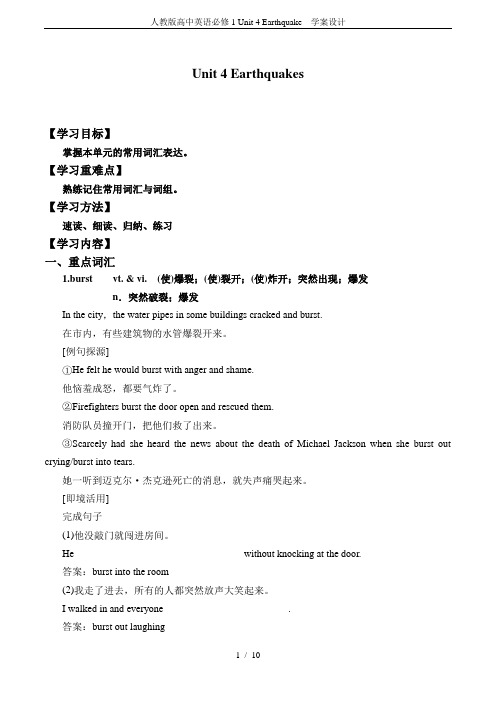
Unit 4 Earthquakes【学习目标】掌握本单元的常用词汇表达。
【学习重难点】熟练记住常用词汇与词组。
【学习方法】速读、细读、归纳、练习【学习内容】一、重点词汇1.burst vt. & vi.(使)爆裂;(使)裂开;(使)炸开;突然出现;爆发n.突然破裂;爆发In the city,the water pipes in some buildings cracked and burst.在市内,有些建筑物的水管爆裂开来。
[例句探源]①He felt he would burst with anger and shame.他恼羞成怒,都要气炸了。
②Firefighters burst the door open and rescued them.消防队员撞开门,把他们救了出来。
③Scarcely had she heard the news about the death of Michael Jackson when she burst out crying/burst into tears.她一听到迈克尔·杰克逊死亡的消息,就失声痛哭起来。
[即境活用]完成句子(1)他没敲门就闯进房间。
He ________ ________ ________ ________without knocking at the door.答案:burst into the room(2)我走了进去,所有的人都突然放声大笑起来。
I walked in and everyone________ ________ ________.答案:burst out laughing2. injure vt. 损害;伤害Two-thirds of them died or were injured during the earthquake.他们中有2/3在地震中伤亡。
[例句探源]①Two men were severely injured trying to save a 5yearold girl from a pit bull.两名男子奋力从比特犬嘴下救出一名五岁小女孩时身受重伤。
人教高中英语必修一 unit4 earthquakes词汇导学案设计(无答案)

Unit4 EarthquakePeriod2. Language points【学习目标】1. 扎实掌握重点词汇与重点句型的用法,提高自己的语言运用能力。
2. 自主学习,合作探究;掌握分析句子成分与概括框架知识的方法。
3. 激情投入,运用所学词汇表达情感并激情投入,体验学习的快乐。
【重点和难点】单词和短语的用法以及重点句型的运用。
【使用说明】 1. 15分钟:理解和记忆四个单词、四个短语和语法的用法,并在每个例句后面提炼用法。
不明白的地方,用红笔标出, 准备质疑讨论。
2. 10分钟:合作探究学案上的难例句、不明白的地方、每个知识的框架用法和跟踪练习。
3. 5分钟:点评质疑提升。
4. 5分钟:巩固落实。
5. 5分钟:当堂检测。
-----------------------------------课前预习案-------------------------------------------Task 1 根据汉语提示写出下列词汇或短语。
(方法引导:先默写,然后再核对答案,错误之处用红笔标出,写出正确单词并加以巩固。
)1. ____________ vi.n 爆裂,爆发2. ___________ 仿佛,好像3. ____________ vt.损害,伤害4. ___________ vt.vi.n 震惊,震动5. ____________ vt.n使陷入困境,困境6. ___________严重受损,破败不堪7. ____________ 掘出,发现8. ____________ vt.埋葬;掩埋;隐藏9. ____________ 许多;大量的10. ____________ n.质量;品质;性质11. ____________ adj.积极的;活跃的12. ____________ vt.献身;专心于Task 2 完成课本第28页第1、2、3三题。
In class:(课上展示交流、研讨提升)Step1.Check up the students’work.Step2 Grasp the following language points:(方法指导:先把原文句子呈现出来,然后认真浏览知识点的解析,并完成相应的练习)【我的疑惑】-----------------------------------课中探究案-------------------------------------------【我的任务】※探究一:词汇探究【自主学习】15分钟:【基础知识部分】1. A ______ gas came ___ __ the cracks.smelly : smell+ y = adj.扩展: n.+y构成形容词blood---- mud---- sun----- cloud---- rain---- wind--- taste---- ice---- greed---- health→wealth →2. burst vi.vt. (burst---burst---burst) 使某物爆炸,胀破,爆破, 破裂burst in/into a door/ room /building 突然进入门/房间/大楼burst into sth. = burst out doing 突然…起来n. a burst of ...一阵...a burst of laughter /thunder /applause(欢呼)1. 他没有敲门就突然进入房间. He _________________without knocking at the door2. 他们全都突然笑起来/哭起来/唱起来. All of them _________________3.It seemed as if the world was at an end. 世界似乎到了末日。
人教版高中英语必修一+Unit+4+Earthquakes+period+4+教案2.doc

Unit4《Earthquakes》教案(4)(新人教版必修1)Period FourTeaching goals1.To help students learn to read about past experiences2.To help students better understand “earthquake”3.To help students use some important words and expressions4. To help students identify examples of the attributive clause in the textTopicBasic knowledge about earthquake; how to protect oneself and help others in disasters Vocabularyearthquake, quake, well, pipe, burst, nation, canal, stream, dirt, ruin, suffering, extreme, injure, destroy, brick, dam, track, shock, rescue, trap, electricity, disaster, bury, mine, miner, shelter, title, reporter, bar, frighten, frightening, frightened, congratulation, judge, express, online, headline, cyclistExpressionsright away, as if, at an end, in ruins, dig out, a number ofFunction1.Talking about past experiencesIt was terrible when…It seemed as if …I remember…I felt…No longer after that…Luckily,…2.Expressing thanksI would like to express my thanks to…who…Here, I wish to express my t hanks for the great efforts…I’d also like to thank…No words are strong enough to express our…GrammarThe Attributive Clause (I) (that, which, who, whose)Teaching AidsMultimedia facilitiesTeaching goalsTo helped students read for clues used in writing to be doneTo helped students write a speechTo helped students listen and answer about earthquakeProceduresStep 1 Warming up1. Discuss it in pairs:①What do you have to consider when you are writing a speech?②How can we express ourselves clearly?2. Reading and underliningRead the letter and exercises again and underline all the useful expressions or collocations in the letter.Step 2 ListeningTurn your books to page 31. We’ll listen to a story about a person who experienced the 1906San Francisc o earthquake. I’ll play the tape three times. First listen and try to get some detailsthat Exercises 1 and 2 requests. Second listen again and try to finish the exercises. Third listenand check your answers.Sep 3 Guided writing1. Making an introductionCompare a newspaper story to a short story and answer the following questions.1) What should you write before writing a newspaper story? (outline)2) What should a newspaper outline have? (a headline; a list of main ideas; a list of importantdetails)3) Why a headline is needed? (It can tell the readers what the topic is; it can also attract thereaders’ attention)4) How can you finish a newspaper story? (First, you should write a headline, then organizeyour main ideas into paragraphs, and then put some details into each paragraph.)5) Have you found out the difference between a newspaper story and a short story?(Usually a short story begins with small details and includes big details later. A newspaper story does just the opposite. Both kinds of stories use paragraphs with main ideas. In a good newspaper story, the point-of-view is objective (i.e. it has no point-of-view) while a short story is subjective (i.e. it has a point-of-view). A newspaper story has no conclusion; a short story generally does.)Now I’ll show you a newspaper story to find out the headline, main idea and details of each paragraph.2. Writing for China DailyNow prepare the outline for a short newspaper story for China Daily. You can use the example in exercise 1 to help you organize your outline.Step 4 Language points1.make a speech, give a speech2.congratulations to sb. on sth. congratulate sb. on sth.I offered my congratulations on her success.Congratulations on winning the prize!3.agree with sb. / mind, thought, idea, methodagree to the plan, proposal, arrangementagree on /upon意见一致4.be proud ofHe is proud of his daughter’s ability to speak four languages.I’m proud of being a student in this famous school.a)take pride in5.honorWe should show honor to the old.尊敬n.[U]尊敬;名誉;荣誉I felt highly honored by your trust.荣幸It is a great honor to be invited. [C]荣幸6.As you know, this is the day the quake happened.As引导非限制性定语从句,代替主句内容As you can see, the stamp shows the new city.As is known to all, the earth travels around.7. at the same time同时;但,然而This is a difficult problem; at the same time it is extremely interesting.They left the room a the same time.品味人生1、不管鸟的翅膀多么完美,如果不凭借空气,鸟就永远飞不到高空。
高中英语 Unit4 Earthquakes学案 新人教版必修1 学案
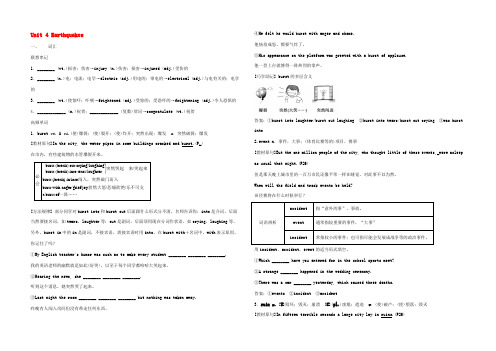
Unit 4 Earthquakes一、词汇联想串记1.________ (vt.)损害;伤害→injury (n.)伤害;损害→injured (adj.)受伤的2.________ (n.)电;电流;电学→electric (adj.)用电的;带电的→electrical (adj.)与电有关的;电学的3.________ (vt.)使惊吓;吓唬→frightened (adj.)受惊的;受恐吓的→frightening (adj.)令人恐惧的4._____________ (n.)祝贺;_____________ (复数)贺词→congratulate (vt.)祝贺高频单词1.burst vt. & vi.(使)爆裂;(使)裂开;(使)炸开;突然出现;爆发n.突然破裂;爆发[教材原句]In the city, the water pipes in some buildings cracked and burst.(P 26)在市内,有些建筑物的水管爆裂开来。
必会⎭⎪⎬⎪⎫burst (break) out crying/laughingburst (break) into tears/laughter突然哭起来/笑起来burst (break) in/into闯入,突然破门而入burst with anger/grief/joy勃然大怒/悲痛欲绝/乐不可支a burst of一阵……[方法规律] 部分同学对burst into和burst out后面跟什么形式分不清,名师告诉你:into是介词,后面当然要接名词,如tears,laughter等;out是副词,后面须用现在分词作状语,如crying,laughing等。
另外,burst in中的in是副词,不接宾语,需接宾语时用into。
在burst with+名词中,with表示原因。
你记住了吗?①My English teacher's humor was such as to make every student ________ ________ ________.我的英语老师的幽默就是如此(好笑),以至于每个同学都哈哈大笑起来。
人教版高一英语 Book1 Unit4 Earthquakes 二次过关学案(学生版)
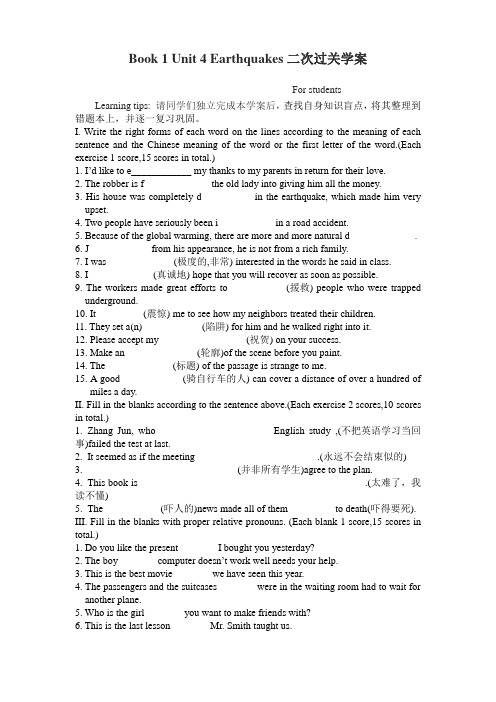
Book 1 Unit 4 Earthquakes二次过关学案For studentsLearning tips: 请同学们独立完成本学案后,查找自身知识盲点,将其整理到错题本上,并逐一复习巩固。
I. Write the right forms of each word on the lines according to the meaning of each sentence and the Chinese meaning of the word or the first letter of the word.(Each exercise 1 score,15 scores in total.)1. I’d like to e____________ my thanks to my parents in return for their love.2. The robber is f_____________ the old lady into giving him all the money.3. His house was completely d__________ in the earthquake, which made him very upset.4. Two people have seriously been i___________ in a road accident.5. Because of the global warming, there are more and more natural d_____________.6. J____________ from his appearance, he is not from a rich family.7. I was _____________(极度的,非常) interested in the words he said in class.8. I ____________ (真诚地) hope that you will recover as soon as possible.9. The workers made great efforts to ___________(援救) people who were trapped underground.10. It _________(震惊) me to see how my neighbors treated their children.11. They set a(n)__________ (陷阱) for him and he walked right into it.12. Please accept my _________________(祝贺) on your success.13. Make an ______________(轮廓)of the scene before you paint.14. The _____________(标题) of the passage is strange to me.15. A good ____________(骑自行车的人) can cover a distance of over a hundred ofmiles a day.II. Fill in the blanks according to the sentence above.(Each exercise 2 scores,10 scores in total.)1. Zhang Jun, who ______ _______ _______ English study ,(不把英语学习当回事)failed the test at last.2. It seemed as if the meeting ________ ________ _______.(永远不会结束似的)3. ______ _______ ______ _________ (并非所有学生)agree to the plan.4. This book is _______ _______ _______ _______ _______ _______.(太难了,我读不懂)5. The ___________(吓人的)news made all of them _________to death(吓得要死). III. Fill in the blanks with proper relative pronouns. (Each blank 1 score,15 scores in total.)1. Do you like the present _______ I bought you yesterday?2. The boy _______ computer doesn’t work well needs your help.3. This is the best movie _______ we have seen this year.4. The passengers and the suitcases _______ were in the waiting room had to wait for another plane.5. Who is the girl _______ you want to make friends with?6. This is the last lesson _______ Mr. Smith taught us.7. I, _____ am your friend, will help you out.8. The building ___________ wall is white is my uncle’s house.9. Will you please lend me the very picture _________ you bought yesterday?10. The students ________ the teacher praised at the class meeting is our monitor.11. The season _________ comes after spring is summer.12. I’m going to meet Tom ______ they say is a good boy.13. I found some photos of interesting places ______ were not far away from our city.14. There is a boy downstairs _________ wants to see you.15. The river ________ banks are covered with trees is very long.IV. Fill in the blanks according to the Chinese meaning and the whole sentence.(Each exercise 2 scores,10 scores in total.)1. The chickens and pigs were so nervous that they didn’t eat anything.The chickens and pigs were ______ nervous ______ eat anything.2. The world seems to be getting smaller and smaller._____ ______ ______ ______ the world is getting smaller and smaller.3. All the apples are not ready for the children._____ _____ the apples are ready for the children.4. Wherever they looked, almost everything was destroyed.______ they looked, _______ everything was destroyed.5. I won’t go to Shanghai by train. Instead, I’ll go there by air.I will go to Shanghai by air ______ ______ _______train.V. Choose the best answer. (Each exercise 1 score, 25scores in total.)1. —Peter was killed in the earthquake!—_____ I talked with him last week.A. What a pity!B. I beg your pardon.C. Sorry to hear that.D. Is that so?2. We’ll not attend the meeting _____ we are invited.A. ifB. andC. unlessD. once3. The joke was ________ that every student burst into________.A. so funny; laughingB. such funny; laughingC. so funny; laughterD. such funny; laughter4. Wash your hands with soap _____ the experiment.A. in the end ofB. at the end ofC. to the end ofD. by the end of5. His strength had almost _____ when they found him in the desert.A. given outB. given inC. given upD. given off6. Many people came to the meeting, _____ of whom left early.A. numberB. the numbersC. the numberD. a number7. I’ll sp end my holiday in Shanghai, _____ lies on the coast.A. whoB. whichC. whereD. that8. On _____ the bad news, she cried with her face _____ in his hands.A. hear; buryB. hear; buriedC. heard; buryingD. hearing; buried9. Not far from the club, there was a garden, _____ owner was sitting in it playingcards with his children every afternoon.A. itsB. whoseC. whichD. of which10. It’s quite _____ to be a member of the English-Zone Club.A. a prizeB. a priceC. an honorD. a value11. I met the teacher in the street yesterday _____ taught me English three years ago.A. whichB. whenC. whereD. who12. The people there were greatly _____ to see everything changed over a night.A. pleasedB. shockedC. interestedD. moved13. Tell us about the people and the places _____ are different from ours.A. thatB. whoC. whichD. Whom14. _____ is no wonder the building is _____.A. It; in ruinsB. That; in ruinsC. This; in ruin D It; in ruin15. —Do you mind if I open the window?—_____, but I’ve caught a bad cold today.A. No, not at allB. Yes, of course notC. Yes, pleaseD. I’m sorry16. Yesterday my brother was badly ______ in the accident, and now his life is_______.A. injured ; in dangerB. destroyed ; dangerousC. hurt ; dangerousD. wounded ; in danger17. People were ________ at her sudden death. It was really _______ to them.A. shocked; shockedB. shocked; a shockC. shocking; a shockD. shocking; shocking18. Believe it or not, it is the biggest watermelon ________ I have ever seen.A. whichB. thatC. whenD. where19. He insisted that he _______ right and she _______ him.A. is; should not leaveB. was ; should leave notC. was; not leaveD. is; leave not20.You should know how to communicate with others. First learning to _______yourself well is very important.A.expressB. findC. introduceD. recognize21. —The exam was easy,wasn't it?—Yes,but I don't think ________ could pass it.A. somebodyB. anybodyC. nobodyD. everybody22. —I hear they will get married next week. —________A.Good luck! B.Congratulations! C.Oh,really? D.Yes,sir?23. ________ from what he did,he isn't a person to depend on.A. JudgeB. JudgingC. JudgedD. Judges24. This is the kite _______ Billy Fisher gave to TomA. whoB. whichC. /D. Both B and C25. Do you think most students prefer tests ____ have easy questions?A. whoB. whereC. whenD. thatVI. Fill in the blanks with proper words and phrases from Unit 4. (Each exercise 1 scores.10 scores in total.)Strange things were happening in the countryside of Hebei, but the one million people of the city, who_______ _____ ____(忽视、轻视)these events, were asleep ____ ________(像往常一样) that night.At 3:42 am. Everything began to __________(摇晃).In fifteen terrible seconds a large city ____ ____ ______ (成为废墟).___ _______ _____(看起来好像) the world was ___ ___ ____ (结束、终结).Supply of water, food and electricity were ___ ____(切断).People began to ________ (想知道)how long the _________(灾难)would last. All hope was not _________(破灭). The army sent 150 thousand soldiers to help the ________ (救援)workers. Slowly, the city began to ________ (呼吸)again. VII. Write a report according to the tips and Chinese translation. About 120 word. (15scores in total.)Expressions about earthquakes:1. I was about to …when the floor quaked and shook.当地板开始震动摇晃的时候,我正要…2. The quake happened while people were…地震发生的时候人们正在…3. It felt like a train running under the ground.感觉好像是火车在地面以下轰鸣。
人教版新课标必修一 Unit 4 Earthquakes学案
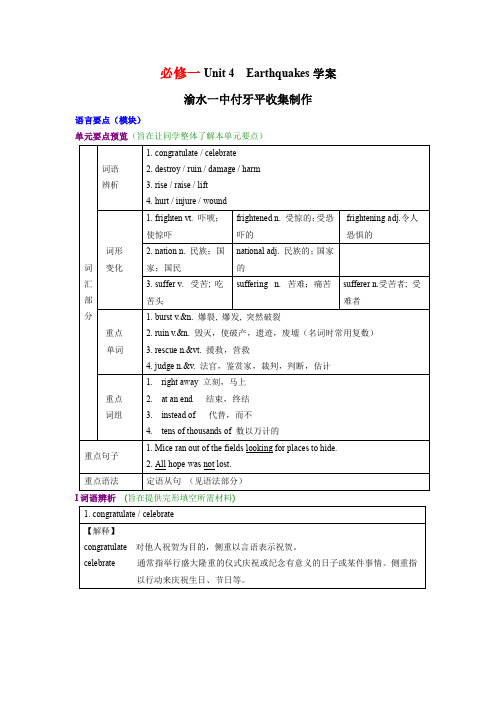
必修一Unit 4 Earthquakes学案渝水一中付牙平收集制作语言要点(模块)单元要点预览(旨在让同学整体了解本单元要点)I词语辨析(旨在提供完形填空所需材料)II词性变化(旨在提供语法填空所需材料)Ⅲ重点词汇(旨在提供综合运用所需材料)1. burst v.&n. 爆裂, 爆发, 突然破裂[典例]1).The red balloon suddenly burst. 那个红色的气球突然爆了。
2). The police burst through the door. 警察破门而入。
3). On hearing the news, Leslie burst into laughter while Tracy burst out crying.一听到这则消息,Leslie突然大笑,而Tracy则突然大哭起来。
4). A burst of hand-clapping followed the ending of the song.歌声结束后响起了一阵掌声。
[重点用法]burst into laughter = burst out laughing 突然大笑burst into tears = burst out crying 突然大哭[练习] 中译英1). 水管在寒冷的天气里经常冻裂。
__________________________________________________________________________________________2). 太阳突然从云端里露出来。
_______________________________________________________________________________ ___________答案: 1). Water-pipes often burst in cold weather.2). The sun burst through the clouds.2. rescue n.&vt. 援救,营救[典例]1). The police came to his rescue and pulled him out of the river.警察来救他,把他从河里拉了出来。
人教版必修1 unit4 Earthquakes period2教学设计
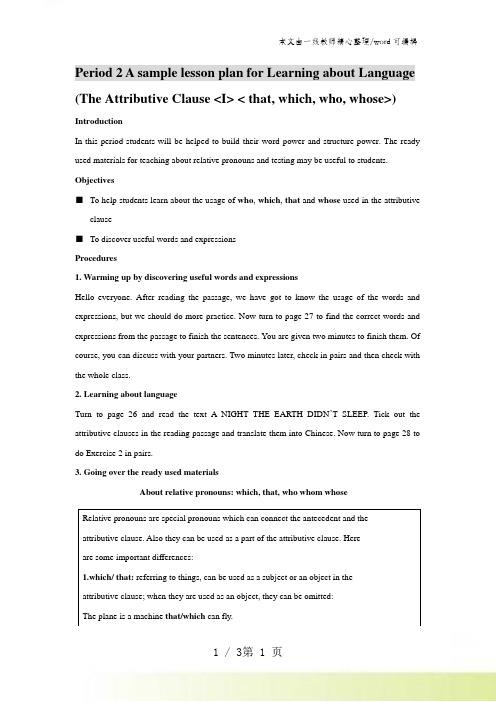
Period 2 A sample lesson plan for Learning about Language (The Attributive Clause <I> < that, which, who, whose>) IntroductionIn this period students will be helped to build their word power and structure power. The ready used materials for teaching about relative pronouns and testing may be useful to students. Objectives■To help students learn about the usage of who, which, that and whose used in the attributive clause■To discover useful words and expressionsProcedures1. Warming up by discovering useful words and expressionsHello everyone. After reading the passage, we have got to know the usage of the words and expressions, but we should do more practice. Now turn to page 27 to find the correct words and expressions from the passage to finish the sentences. You are given two minutes to finish them. Of course, you can discuss with your partners. Two minutes later, check in pairs and then check with the whole class.2. Learning about languageTurn to page 26 and read the text A NIGHT THE EARTH DIDN’T SLEEP. Tick out the attributive clauses in the reading passage and translate them into Chinese. Now turn to page 28 to do Exercise 2 in pairs.3. Going over the ready used materialsAbout relative pronouns: which, that, who whom whoseRelative pronouns are special pronouns which can connect the antecedent and theattributive clause. Also they can be used as a part of the attributive clause. Hereare some important differences:1.which/ that: referring to things, can be used as a subject or an object in theattributive clause; when they are used as an object, they can be omitted:The plane is a machine that/which can fly.The school (that/which) he visited last week is to the south of the city.2.that/ who/whom: referring to a person, can be used as subject or object in the attributive clause; whom can be used as an object:The girl (that/whom/who) we saw yesterday was Jim’s sister.The man that/who is talking to my father is my maths teacher.3. whose: referring to a person or a thing, can be used as an attribute in the attributive clause:This is the writer whose name is known all over the world.The room whose window faces south is mine.4.Before everything, anything, everybody, anybody, all, the best +n, the fifth +n, we use that instead of which:All (that) I need is time.This is the largest factory (that) I have ever visitedThe sixth lesson (that) we are learning is the most difficult in Book Two.5. We can’t use that in a Non-Defining Attributive Clause:I have lost the pen, which I like very much.I have two sisters, who are both teachers.4. Closing down by doing a quizNow you are going to take a quiz on Relative Pronouns.Fill in the blanks, using which, that, who, whom, whose.(1) The force _____ causes everything to fall towards the ground is called gravity.(2) A friend_____ helps you in time of need is a friend indeed.(3) Do you know the girl_____ parents are teachers in our school?(4)The woman _____ I spoke to just now is my English teacher.(5) He saw a house_____ windows were all broken.(6)Everything _____ can be done today mustn’t be done tomorrow.(7)Can you think of anyone_____ could look after him?(8)This is the best hotel_____ I know.(9)The man _____ I saw told me to come back today.(10)Those_____ want to go to the Great Wall write down your names here.(11) He talked a lot about the teachers and the schools_____ he had visited.(12)The ninth lesson _____ we are learning is the most difficult in Book One.(13)Mount Blanc(勃朗峰), _____ they visited last month, is the highest mountain in Europe.(14)We know all the teacher_____ work in our school.(15)The house in_____ Lu Xun once lived is a museum now.(16)The house _____ Lu Xun once lived is a museum now.(17)The house_____ Lu Xun once lived in is a museum now.(18)You can take any room_____ you like.(19) He showed a machine_____ parts are too small to be seen.(20)The sports meet was put off, _____ was exactly what we wanted.Keys: (1) which/that (2) who/that (3) whose (4) whom/that/who (5) whose (6) that (7) that (8) that (9) that/whom/who (10) who (11) that (12) that (13) which (14) that (15) which (16) in which/where (17) which/that (18) that (19) whose (20) which。
人教版高中英语必修一教案:Unit+4+Earthquakes(2).doc
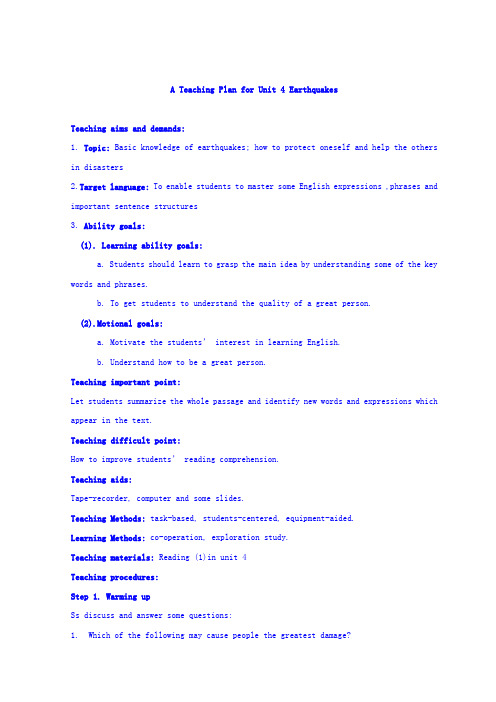
A Teaching Plan for Unit 4 EarthquakesTeaching aims and demands:1. Topic: Basic knowledge of earthquakes; how to protect oneself and help the others in disasters2.Target language: To enable students to master some English expressions ,phrases and important sentence structures3. Ability goals:(1). Learning ability goals:a. Students should learn to grasp the main idea by understanding some of the key words and phrases.b. To get students to understand the quality of a great person.(2).Motional goals:a. Motivate the students’ interest in learning English.b. Understand how to be a great person.Teaching important point:Let students summarize the whole passage and identify new words and expressions which appear in the text.Teaching difficult point:How to improve students’ reading comprehension.Teaching aids:Tape-recorder, computer and some slides.Teaching Methods: task-based, students-centered, equipment-aided.Learning Methods: co-operation, exploration study.Teaching materials: Reading (1)in unit 4Teaching procedures:Step 1. Warming upSs discuss and answer some questions:1. Which of the following may cause people the greatest damage?A. earthquakeB. typhoonC. floodD. drought2.Imagine your home begins to shake and you must leave it right away. You have time to take only one thing. What will you take? Why?Step 2. Pre-readingSs discuss and answer:1.Do you know what would happen before an earthquake?2.What can we do to keep ourselves safe from an earthquake?3. Do you know anything about Tangshan Earthquake in 1976?Step 3. Reading1.Skimming and find the answers to the following questions:a.What happened?b.When and where did it happen?2.Ss read again and fill in the following form:3.Ss read the whole passage again and get the main ideas of each part:Part 1. The natural signs of a coming earthquakePart 2. The damage of the city after the earthquakePart 3. The help to the survivorsStep 4. Discussion1.Ss in pairs, choose eight things from the list on page 67 to put into their personalearthquake bag.2.now join with another pair and discuss your choices. Make another list of items andput them into the following list:my personal earthquake bag will contain:1).___________ 2). ____________ 3). _______________ 4). ____________5)._____________ 6).__ __________ 7). _____________ 8). _____________Step 5. Assignment——. writing task精美句子1、善思则能“从无字句处读书”。
高中英语Unit 4 Earthquakes教案(2)新课标 人教版 必修1
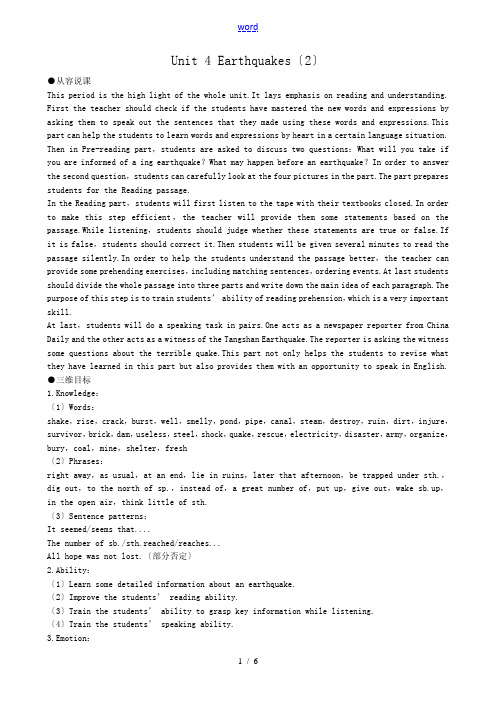
Unit 4 Earthquakes〔2〕●从容说课This period is the high light of the whole unit.It lays emphasis on reading and understanding. First the teacher should check if the students have mastered the new words and expressions by asking them to speak out the sentences that they made using these words and expressions.This part can help the students to learn words and expressions by heart in a certain language situation. Then in Pre-reading part,students are asked to discuss two questions:What will you take if you are informed of a ing earthquake?What may happen before an earthquake?In order to answer the second question,students can carefully look at the four pictures in the part.The part prepares students for the Reading passage.In the Reading part,students will first listen to the tape with their textbooks closed.In order to make this step efficient,the teacher will provide them some statements based on the passage.While listening,students should judge whether these statements are true or false.If it is false,students should correct it.Then students will be given several minutes to read the passage silently.In order to help the students understand the passage better,the teacher can provide some prehending exercises,including matching sentences,ordering events.At last students should divide the whole passage into three parts and write down the main idea of each paragraph.The purpose of this step is to train students’ability of reading prehension,which is a very important skill.At last,students will do a speaking task in pairs.One acts as a newspaper reporter from China Daily and the other acts as a witness of the Tangshan Earthquake.The reporter is asking the witness some questions about the terrible quake.This part not only helps the students to revise what they have learned in this part but also provides them with an opportunity to speak in English.●三维目标1.Knowledge:〔1〕Words:shake,rise,crack,burst,well,smelly,pond,pipe,canal,steam,destroy,ruin,dirt,injure,survivor,brick,dam,useless,steel,shock,quake,rescue,electricity,disaster,army,organize,bury,coal,mine,shelter,fresh〔2〕Phrases:right away,as usual,at an end,lie in ruins,later that afternoon,be trapped under sth.,dig out,to the north of sp.,instead of,a great number of,put up,give out,wake sb.up,in the open air,think little of sth.〔3〕Sentence patterns:It seemed/seems that....The number of sb./sth.reached/reaches...All hope was not lost.〔部分否定〕2.Ability:〔1〕Learn some detailed information about an earthquake.〔2〕Improve the students’ reading ability.〔3〕Train the students’ ability to grasp key information while listening.〔4〕Train the students’ speaking ability.3.Emotion:〔1〕Train the students’ ability to cooperate with others.〔2〕Know the deadliness of an earthquake and the signs before an earthquake is ing.〔3〕Learn from the bravery of people in Tangshan to face the reality and rebuild the city.●教学重点〔1〕The new words and expressions.〔2〕Learn some detailed information about an earthquake.〔3〕Train the students’ ability to cooperate with others.〔4〕Train the students’ speaking ability.●教学难点1.Words:shake,burst,rise,destroy,shock,fresh,injure2.Phrases:right away,at an end3.Sentence patterns:〔1〕It seemed/seems that....〔2〕The number of sb./sth.reached/reaches....〔3〕All hope was not lost.〔部分否定〕4.Improve the students’ reading ability.5.Train the students’ ability to grasp key information while listening.●教具准备〔1〕a tape recorder〔2〕a projector〔3〕the blackboard●教学过程Step 1 GreetingsGreet the whole class as usual.Step 2 RevisionT:Yesterday we learnt some new words and expressions.Now please speak out the sentences that you have made using the words and expressions.S1:shake:Shaking one’s head means saying “No〞 in China.S2:rise:The sun rose at six o’clock in the morning.S3:right away:After class,they went to play basketball right away.S4:crack:The vase cracked when it dropped.S5:burst:He burst the door open,using all his strength.S6:ruin:She poured water all over my painting and ruined it.S7:injure:She was badly injured in the accident.S8:survivor:There was no survivor in the big fire last night.S9:destroy:The heavy rain destroyed all our hope of a piic.S10:shock:I was shocked when I heard his accident.S11:rescue:We rescued the boy who fell into the river.S12:disaster:The flood was really a terrible natural disaster.S13:organize:Jane organized the party.She asked people to e and bought the food and drinks. S14:bury:Many men were buried underground when there was an accident at the mine.S15:shelter:He had to stand in the shelter at the bus stop when it suddenly rained.S16:at an end:She felt the world was at an end when her son died.S17:useless:It is useless arguing with him.He will never change his mind.S18:dig out:The thief dug out the box full of money and ran away.S19:fresh:These vegetables are fresh,I picked them this morning.Step 3 Pre-readingT:Suppose you are warned of a ing earthquake.Now you have time to take only one thing.Tell your partner what you will take and the reason.〔After several minutes.〕S1:I will take enough food.One can’t live without food.S2:I will take enough water.I think water is more important than food.S3:If it is winter,I will take enough clothes,otherwise,I will die from coldness.T:If an earthquake is around the corner,there must be some abnormal phenomena.Carefully look at the four pictures on Page 25 and try to describe what you have seen.S4:In the first picture,people see bright light in the sky.S5:In the second picture,the dog is always barking.S6:In the third picture,fish are trying to jump out of the pond.Even the rats are trying to run away from their holes.They are running nervously.S7:In the last picture,the water in the well rises and falls,rises and falls for many times.People can notice cracks in the well and smelly gas e out of the wells.Step 4 ListeningT:Everyone knows that an earthquake is very terrible.Today,we will learn something about the strongest earthquake in China’s history,which happened in Tangshan,Hebei,in 1976.T:First listen to the tape with your textbooks closed and check whether the following statements are true or false.If it is false,try to correct it.〔1〕People in Tangshan were warned of the earthquake and didn’t go to bed that night.〔〕〔2〕People in Beijing also felt the earthquake.〔〕〔3〕More than 400000 people were killed in the quake.〔〕〔4〕Many rescue workers and doctors were trapped under the ruins during the aftershock.〔〕〔5〕People tried to get fresh water from under the ground in Tangshan.〔〕〔After listening to the tape,check the answers with the students.〕S1:No.1 is false.People thought little of the unusual phenomena before the quake,and went to bed as usual that night.S2:No.2 is true.S3:No.3 is false.More than 400000 people were killed or injured in the quake.S4:No.4 is true.S5:No.5 is false.Fresh water was taken to the city of Tangshan by train,truck and plane. T:You did an excellent job.Step 5 ReadingT:Next,open your books and turn to Page 26.I will give you several minutes to read the passage.After reading,please finish Part 1 in prehending on Page 27.〔Ss read the passage silently and then do exercise 1 in prehending on Page 27.〕〔Teacher check the answers with the whole class.〕S1:The chickens didn’t eat because they were nervous.S2:Before the earthquake the people didn’t worry because they didn’t know the quake caused the strange events.S3:Such a great number of people died because the quake happened while they were sleeping.S4:Water was needed because dams and wells were useless.S5:The people did not lose hope because the army came to help them.T:Very good.During the quake many things happened.Number the following things according to the order that they happened.A.Brick buildings were destroyed.B.The walls of the village wells had cracks in them.C.Shelters were put up for those with no homes.D.Roads got huge cracks.E.The army helped the survivors.〔Ss read the passage again in a loud voice and then order the events.〕〔Teacher checks the answers with the whole class.〕S6:No.1 B; No.2 D; No.3 A; No.4 E; No.5 C.T.Excellent.How many paragraphs are there in this passage?Ss:Four.T:Try to divide the passage into three parts.Then try to write down the main idea of each part.You can finish this task in pairs.〔After several minutes.〕S7:Part 1 〔Paragraph 1〕 Phenomena before the earthquake.Part 2 〔Paragraphs 2-3〕 What happened during the quake and the damage.Part 3 〔Paragraph 4〕 The rescue work after the earthquake.Step 6 Speaking 〔pair work〕T:Now we are going to an interview in pairs.Suppose one of you was a newspaper reporter,and the other was a witness of the 1976 Tangshan Earthquake.Now the newspaper reporter is asking the witness some questions.Work in pairs please.〔Ss make dialogues.〕T:Now I would like to ask pairs of you to e to the front to demonstrate your dialogues to the whole class.S1:Hello,nice to meet you.I am a newspaper reporter from China Daily.S2:Nice to meet you too.S1:I hear that you are lucky enough to have escaped from the terrible earthquake that happened in Tang-shan.S2:Yes.I was so lucky as to be one of the survivors.Even at this time,my heart is still trembling with fear.S1:Then could you answer some questions about the earthquake?S2:OK.I will try to control my feelings.S1:Actually,at what time did you know that an earthquake was ing?Were you warned of the earthquake?S2:Although later people said there had been some signs that showed an earthquake was ing,we paid no attention to these events.We just went to bed as usual that night.S1:Do you know any signs?S2:Yes.For three days the water in the village wells rose and fell,rose ad fell.Some housewives noticed that the well walls had deep cracks in them.A smelly gas came out of the cracks.In the farmyards,the chickens and even the pigs were too nervous to eat.Mice ran out of the fields looking for places to hide.Fish jumped out of bowls and ponds.S1:Then do you still remember what happened during the quake?S2:Oh.At 3:42 am everything began to shake.A huge crack that was about eight kilometers long and thirty meters wide cut across houses,roads and canals.Steam burst from holes in the ground.The terrible earthquake lasted for about 15 seconds.After that,everywhere I looked nearly everything was destroyed.Bricks covered the ground like red autumn leaves.Many buildings fell down.To make things worse,two dams and most of the bridges also fell.It’s impossible to travel.The railway tracks were useless pieces of steel.S1:I heard there were some aftershocks.Did they cause any damage?S2:Of ter that afternoon,another big quake shook Tangshan.Some of the rescue workers and doctors were trapped under the ruins.More buildings fell down..S1:Although you have survived,you have to live a hard life in the next period of time.S2:That is true.Water,food and electricity were hard to get.Life was very difficult for us. S1:But luckily,you have army to help you.S2:Yes.The army sent 150000 soldiers to help the rescue workers.They organized teams to dig out those who were trapped and bury the dead.S1:Then how do you get water these days?S2:Water is brought to the city by train,truck,and plane.We people in Tang-shan will try out best to rebuild the city.S1:I believe so.Thank you for having answered my questions.S2:That’s all right.Step 7 HomeworkTry to remember the key information of the passage by heart.●板书设计●活动与探究Story-telling petition1.Divide the class into groups of four or five.Each student should look for some unusual things that happened in the Tangshan earthquake.The students can go to the library or go online to search for some useful information.2.Work in groups and tell the students’ own story to other members of the same group.Then each group should choose the most unusual story in the group.3.Choose one representative of each group who will tell the most unusual story to the whole class.4.The teacher acts as the judge and chooses the best story and the best story-teller.5.The teacher gives the group that has the best story a prize and gives the best story-tellera prize.●备课资料Tangshan:The Deadliest EarthquakeFireballs and Animals Give WarningThough scientific earthquake prediction is in its nascent〔初期的〕 stages,nature often gives some advance warning of an impending〔即将发生的〕 earthquake.In a village outside of Tangshan,well water reportedly rose and fell three times the day before the earthquake.In another village,gas began to spout〔喷出〕 out the water well on July 12th and then increased on July 25th and 26th.Other wells throughout the area showed signs of cracking. Animals also gave a warning that something was about to happen.One thousand chickens in Baiguantuan refused to eat and ran around excitedly chirping.Mice and yellow weasels were seen running around looking for a place to hide.In one household in the city of Tangshan,a goldfish began jumping wildly in its bowl.At 2 a.m.on July 28th,shortly before the earthquake struck,the goldfish jumped out of its bowl.Once its owner had returned him to his bowl,the goldfish continued to jump out of its bowl until the earthquake hit. Strange?Indeed.These were isolated incidents,spread across a city of a million people and a countryside scattered with villages.But nature gave additional warnings.The night preceding the earthquake,July 27th-28th,many people reported seeing strange lights as well as loud sounds.The lights were seen in a multitude of hues.Some people saw flashes of light;others witnessed fireballs flying across the sky.Loud,roaring noises followed the lights and fireballs.Workers at the Tangshan airport described the noises as louder than that of an airplane.Earthquake and QuakeproofSome countries,such as Japan,have a large number of earthquakes.Earthquakes happen very quickly and violently.During an earthquake,there is often a great noise first.Then the earth shakes terribly;many houses fall down;railway tracks break and trains run off lines;a great many factories are destroyed;thousands of deaths are caused,and many more lose homes.Besides the great damage and deaths caused by the earthquake itself,other disasters such as fires often follow,more building destroyed and more deaths caused.It is well known of the dangers of a possible earthquake,and for centuries man has been making researches on earthquake.More than 2000 years ago,for example,a Chinese scientist named Zhang Heng invented a machine which could detect earthquakes,and this machine is still used by scientists today to detect and measure the strength of earthquakes.Now we know much more about earthquakes and why they happen,but we still cannot tell exactly when and where an earthquake will happen,and cannot stop it from happening.So earthquakes are among the worst disasters in the world.No one can stop natural earthquakes.However,scientists can help stop earthquakes destroying whole cities and causing too many deaths.In those areas where earthquakes often happen,they record mountain temperatures and take photos from the air and if anything starts to happen,they warn governments to be prepared for possible disasters so that emergency plans are put into action to lessen the disaster,probably saving many lives.。
高中英语 Unit 4 Earthquakes学案2新人教版必修1
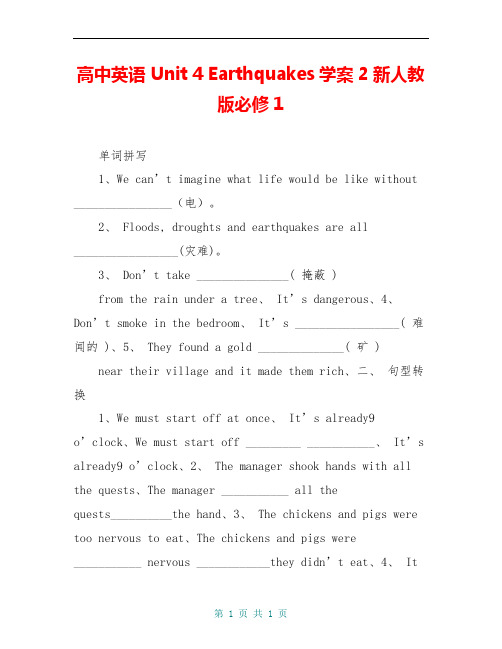
高中英语 Unit 4 Earthquakes学案2新人教版必修1单词拼写1、We can’t imagine what life would be like without ________________(电)。
2、 Floods, droughts and earthquakes are all_________________(灾难)。
3、Don’t take _______________( 掩蔽 )from the rain under a tree、It’s dangerou s、4、Don’t smoke in the bedroom、It’s _________________( 难闻的 )、5、 They found a gold ______________( 矿 ) near their village and it made them rich、二、句型转换1、We must start off at once、It’s already9o’clock、We must start off _________ ___________、It’s alread y9 o’clock、2、 The manager shook hands with all the quests、The manager ___________ all thequests__________the hand、3、 The chickens and pigs were too nervous to eat、The chickens and pigs were___________ nervous ____________they didn’t eat、4、 Itseems that they will arrive in the city before dark、They __________ ____________ ___________ the city before dark、5、 Could you take a message to Lily ? You work with her mother、 (合并成定语从句)Could you take a message to Lily __________ ______________________________________ _______________、三、用所给短语适当形式填空 burst into , burst out , right away , at an end , dig out , blow away , a great number of, think little of , in ruins , too…to1、After the hurricane many building were___________________、2、 When will the party be___________________?3、 It is said that the villagers have_____________________a lot of treasure from those bombs、4、 Seeing a car coming at her at a top speed , the girl was ____________________frightened _____________move、5、As soon as she saw me she _____________tears、6、________________people were killed in the earthquake、7、Everybody ____________________the film 、8、 The wind was so heavy that the tops of many houses were_____________________、9、 There is little time left、 We are to start ______________________、10、I can’t help _____________________laughing seeing his strange glasses、。
高中英语 Unit 4 Earthquakes Part 2 Reading学案新人教版必修1
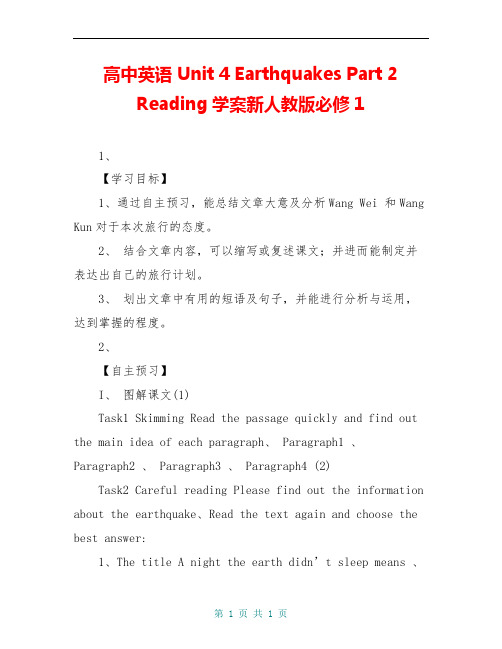
高中英语 Unit 4 Earthquakes Part 2Reading学案新人教版必修11、【学习目标】1、通过自主预习,能总结文章大意及分析Wang Wei 和Wang Kun对于本次旅行的态度。
2、结合文章内容,可以缩写或复述课文;并进而能制定并表达出自己的旅行计划。
3、划出文章中有用的短语及句子,并能进行分析与运用,达到掌握的程度。
2、【自主预习】I、图解课文(1)Task1 Skimming Read the passage quickly and find out the main idea of each paragraph、 Paragraph1 、Paragraph2 、 Paragraph3 、 Paragraph4 (2)Task2 Careful reading Please find out the information about the earthquake、Read the text again and choose the best answer:1、The title A night the earth didn’t sleep me ans 、A、 the earthquake was awake all night longB、people on the earth couldn’t fall asleep that nightC、 the earth shook like crazy that nightD、 animals on the earth would not sleep that night2、 Which is NOT true according to the passage?A、 People in Beijing felt the earthquake、B、 People of Tangshan cared much about the strange events before the earthquake、C、 If the earthquake had happened during the daytime, it wouldn’t have caused so many deaths、D、 Many soldiers helped to rescue the people whowere trapped under the ruins、3、 Fresh water was taken to the city by train, truck and plane, because 、A、 the water pipes cracked and burstB、 there was no electricityC、 dams and wells were uselessD、 the well walls had deep cracks in them4、 Which of the following can also be used as atitle of the text?A、 Tangshan EarthquakeB、 The world at an end、C、 How to prevent an earthquake、D、 New Tangshan、5、 What does the last sentence Slowly, the city began to breathe again mean?A、 People who were trapped came to life、B、 The trees turned green、C、 The animals began to breathe、D、 The city returned to normal gradually、 II、写写记记:仔细读读课文,你会发现他们的哟!1、挖出;掘出2、结束3、处于一片废墟4、对……不加考虑5、像往常一样6、仿佛;就好像7、被……困住8、倒塌9、严重受伤10、消失;一去不返11、把……刮走12、代替13、在……后不久14、埋葬死人三、【合作探究】1、It seemed as if the world was at an end! 似乎世界末日来临了 (1)as if 意为_________________, 相当于as though, 常用在动词 look, seem, feel 等之后引导表语从句。
- 1、下载文档前请自行甄别文档内容的完整性,平台不提供额外的编辑、内容补充、找答案等附加服务。
- 2、"仅部分预览"的文档,不可在线预览部分如存在完整性等问题,可反馈申请退款(可完整预览的文档不适用该条件!)。
- 3、如文档侵犯您的权益,请联系客服反馈,我们会尽快为您处理(人工客服工作时间:9:00-18:30)。
Unit4 Earthquakes单词学案2
课题: Unit4 Earthquakes
学习目标: 继续学习第四单元的新单词
教学重点:重点词汇的学习
Teaching Steps :(教学步骤)
Step 1 Have a check(检查上节课的内容)
1.进行第四单元单词的第一次过关检测。
2.检查复习第上个学案上的内容
Step 2 Read the words and expressions on page 95
(读熟95页第四单元的新单词和短语)
请同学们掌握好第四单元的词汇。
词汇的学习在于日积月累,只有掌握大量丰富的词汇,才能为以后的做题打好坚实的基础,做题也才能得心应手。
Step 3 Learn the following words by yourselves.(自学导学案这部分的内容,把不会的词画出,自己查字典或向同学、老师请教。
)
Part Two 继续学习第四单元的单词(接第28个导学案)
14. rescue v. n.援救the rescue team 援救组
Engineers made several different plans for rescuing the temple.工程师们制定出许多不同方案援救那座寺庙。
15.dig out 掘出、发现
Some survivors were dug out by the soliders. 一些幸存者被士兵发现
16.bury vt.埋葬、埋在
be buried in =bury oneself in 埋头于、专心于
bury one's head in the sand 逃避现实
He buried the treasure under the ground他把财宝埋在地下。
I bury myself in work for the next four hours.
在接下来的四个小时里,我埋头工作。
17. trap vt. 使陷入困境n. 陷阱
They were trapped in the mountains .他们被困在山里面。
The deer was caught in our trap.那只鹿落入我们的陷阱。
18. frighten v.使惊恐frightened adj.感到惊恐frightening adj.令人恐惧的
It was a frighting night.这是个可怕的夜晚。
He was frightened at the sound.听到这种声音他感到惊恐。
be frightened to death 吓得要命
19.congratulate v. 祝贺congratulation n. 祝贺
congratulate sb on sth 为某事祝贺某人I congratulated them on their success.
—I 've beaten Tom at this tennis match by 3 to 1.
在网球比赛中我以三比一战胜汤姆。
___Congratulations (to you)!祝贺你!
20. judge v. 断定、判断n. 法官
judge from (by) 根据.....判断
Don't judge a person by his look.不要以貌取人。
Judging from his accent ,he is from the south.根据他的口音判断,他来自南方。
21. cycle v. 骑自行车、循环cyclist 骑自行车的人
the cycle of the seasons四季的循环
Step3 learn the important words and expressions(重点突破下面的近义词或近义短语)
1. injure \hurt \ wound
(1)injure V..伤害、损害指在意外事故中“负伤、受伤害”也可指对感情、声誉、机会的不利影响。
There were two people injured in the accident.有两个人在事故中受伤。
The scandal has injured his reputation.丑闻损害了他的声誉。
(2)hurt 既可指精神上也可指肉体上的“伤害”
He fell and hurt his leg.他跌倒了,摔伤了腿。
You hurt my feeling .你伤害了我的感情。
(3)wound 指刀伤、剑伤或战争中受到的伤害。
The soldier was badly wounded in th head.这位士兵头部受了重伤。
2.destroy / damage /ruin
(1).destroy 破坏、毁坏,表示无法修复之意。
(2).damage 损害,毁坏,指不彻底的破坏。
(3).ruin毁坏、破坏、毁灭、崩溃也可用于比喻意义。
in ruins 成为废墟
ruin one's hopes(bright future) 使希望破灭/ 毁掉某人的大好前程
(2004福建卷)If you carry on like this ,you will end up in prison ,which will ruin you bright future you may have.
如果你继续这样下去,你迟早会坐牢,毁掉你可能有的大好前程。
3. a number of /a good many/many许多+可数名词
a great deal of / much 大量的、许多+不可数名词
lots of /plenty of 许多+可数或不可数名词
Step4 A quit of the words(当堂检测):
I.单词连线
shock 圈套
rescue 灾难
trap 埋葬
disaster 掩蔽处
bury 矿
shelter 标题
mine 法官
title 提纲
judge 祝贺
outline 震惊
frighten 援救
congratulation 使惊吓
II词性变化:
mine(指人的名词)__________________congratulate(名词)______ frighten(形容词)_______cyclist(动词)_______expression(动词)_________ III.翻译短语:
1.掘出,发现______________
2.埋头于,专心于________________
3.就某事向某人表示祝贺__________
4. 吓得要命______________
5.根据......判断________________
6.许多学生__________________
7.大量的雨____________________ 8.成为废墟__________________
9.伤害某人的感情________________ 10.使希望破灭_______________。
